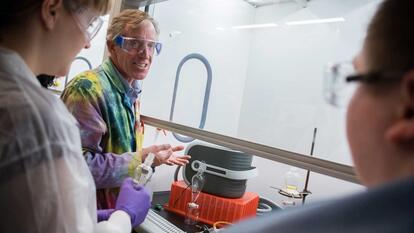Technology to Level—and Broaden—the Playing Field

Students toil away on research papers, only to find their hard work almost always has an audience of one—their professor. But what if class projects could have a much wider reach? Rebecca Darling helps faculty and students discover ways to achieve just that.
As a staff member who specializes in instructional technology, Darling spends her days showing students and professors how to tap into technology to make class assignments more dynamic and, in the process, more accessible and inclusive for students with a wide variety of learning styles, language backgrounds, and disabilities.
“Having different options and tools allows all students to express their knowledge,” Darling says. “If we can raise the general accessibility of courses, then more students get benefits from that. That’s the vision.” Technology can help level the playing field.
Recently, Darling helped students in a Women’s and Gender Studies course choose tools to create their final assignment. One student designed an interactive fiction project—a text-heavy, choose-your-own-adventure-like video game—using open-source tool Twine. The student explored the path of a pregnant woman of color as she sought out medical support. Darling has also worked with students to produce digital stories—three- to five-minute self-filmed videos that argue a point—and podcasts.
Students often share the digital stories and other projects they’ve created in a class Google drive so peers, family, and friends can engage with the content. “It adds another level of accountability and value,” Darling says. “Students often give more effort and they take more ownership of the work they’re creating.”
This is an excerpt from an article by Deborah Lynn Blumberg ’00 that appears in the spring 2020 issue of Wellesley magazine. Read the full story on the Wellesley magazine website.


